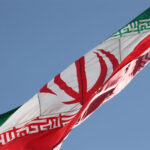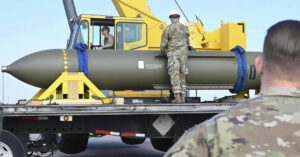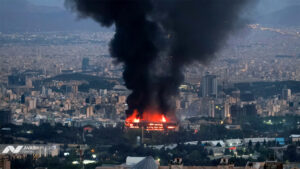The Russians aren’t the only ones trying to figure out what to do following the chaos in Syria; Israel is also reassessing their regional positioning. However, while Israel’s regional strategy will need to be revamped, they have an opportunity to capitalize on this situation.
Syria previously limited Israel’s ability to find security in the region, but a window for change has been opened. With the Shia crescent and its influence on this region being disrupted, the threat that Iran and Hezbollah once posed to Israel has greatly diminished. And while Israel is a bit preoccupied with Gaza and Hamas, there’s not a real threat to Israeli statehood.
It would seem Israel could be ready for a new strategy, but regional relations will be critical in determining how that plays out. Between Egypt, Jordan, Lebanon, and Iran, there’s plenty of countries to keep an eye on; although, the most important places to watch will be Syria and Turkey.
As Syria builds back, we could see a Sunni Arab consolidation, which might cause bigger problems for Israel down the road. But Turkey will be the final boss here; depending on how Turkey approaches Israel, that will determine which strategic path Israel will be forced to go down.
Here at Zeihan on Geopolitics, our chosen charity partner is MedShare. They provide emergency medical services to communities in need, with a very heavy emphasis on locations facing acute crises. Medshare operates right in the thick of it, so we can be sure that every cent of our donation is not simply going directly to where help is needed most, but our donations serve as a force multiplier for a system already in existence.
For those who would like to donate directly to MedShare or to learn more about their efforts, you can click this link.
Transcript
Hey, everybody. Peter Zeihan here. Coming to you from Egmont National Park. That’s Mount Taranaki in the background. And I’m walking through the ahu Kawakawa swamp, which is nonstandard. Anyway, we’re gonna continue talking about the consequences of the fall of the Syrian government. And today we’re going to cover Israel. There’s an old adage going back to the late 70s, that says that there is no war without Egypt and no peace without Syria.
The last major Israeli, Arab conflict was in 1973, and it was a surprise attack. That probably shouldn’t have happened, but it ended with a resounding Israeli victory. And after that, it set the stage for peace talks with the Egyptians, which concluded under Jimmy Carter in 1979. But Syria always stayed on the outside. And the whole concept of that phrase is that Israel is a vulnerable state, and until it has peace with all of its neighbors, it has peace with none of its neighbors, because there just isn’t any strategic depth.
But now the situation has changed. And there is an opportunity here for Israel to do a few things differently, should it so choose, the border with Egypt is internationally monitored, and Egypt is as close to a friend as the Israelis have in the region. And that provides some strategic opportunities here, especially since now that the, northeastern border is open.
So this is gonna take a few places. First of all, the Golan Heights, that’s a chunk of territory that the Israelis captured from the Syrians in a series of conflicts throughout, the 20th century. It hasn’t really been settled, because there’s always this idea that there was eventually going to be a land for peace deal. Well, that doesn’t have to happen now.
So you should expect to see the Israelis make the most of what is actually some significantly fertile territory that, could help a country that imports over half of its foodstuffs. Second, the remaining security concerns are now somewhat limited. There’s this thing called the Shia Crescent that starts in Iran, goes through Iraq, through northern Syria and into Lebanon.
And the idea is this is the area that the Iranians would use to project power. And one of the big fuck ups that the Americans did with the Iraq war is basically shatter what was an Arab Sunni power that ruled that area and allowed the Iranians to penetrate into the region very, very deeply. They don’t control Iraq, but they’re certainly the first power in the country.
Well, now, with Syria broken. The Shia crescent has been cut in half, and the Iranians can no longer drive or even reliably fly equipment or arms or men, to the western part of the crescent, which means that Hezbollah, which is the militant group that the Iranians founded and sponsored, but the Syrians manage, that operates mostly in Lebanon.
Is now, I don’t want to say dead. That’s maybe the wrong word, but certainly gutted. And it will have to do with its own resources and without the Syrians or the Iranians to manage them or reinforce them or provide them with weapons. That’s not a lot. And that’s before you consider that over the last couple of months, the Israelis have done a damn solid job of gutting the entire, Hezbollah leadership.
So there’s still a lot of anger. There’s still plenty of people to recruit from. But as a functional organization, Hezbollah is functionally gone at this point. And with Syria now gone, there’s really no way to rehabilitate it very quickly. This is not the cold War. This is not a period of heavy globalization where freedom of the seas is sacrosanct.
This is a world where if you want to get equipment from A to B, you have to basically get it there yourselves and provide the military escort that’s necessary. And Iran’s not a naval power. Okay. That just leaves where this all started. In recent days, Hamas in Gaza. Now, my assessment of what’s going on there really hasn’t changed.
Hamas, rules Gaza. Gaza is occupied territory. As long as it’s occupied territory, there will be no end of people who are willing to fight the occupiers. And the occupiers are the Israelis. The only question is whether or not the organization that runs the place can get enough equipment and weapons, to fight back in a meaningful way like they did, a year ago, October, when they did that big assault that killed a thousand people.
The Israelis are in the process of crunching that down. They’re building a cordon in the edge of Gaza, and then cutting it in half, basically splitting into tiny little cantons that they feel they can manage more directly. Now, this will guarantee that the population will always be hostile to them. But you’re talking about a low level simmering insurgency, as opposed to something that could generate the military organization that’s necessary to actually attack a state.
So it’s ugly. It will continue to be ugly in fact, it will probably from a human rights point of view and a starvation point of you get uglier. But that doesn’t mean it’s a threat to the state of Israel. And that’s everybody, everyone around, Israel has now been clipped or befriended. Jordan is basically an economic satellite who’s indirectly sponsored by Israel and the United States.
Egypt is relatively friendly. Lebanon, in a good day, is a failed state, and without Hezbollah, they might actually be able to make a go of being a semi ish kind of sort of normal state. And Iran lacks the ability to, dick around in Israeli affairs so long as there is no Syria. Now, there’s two things to keep in mind for a longer term.
First of all, Syria itself. One of the reasons that the Israelis never got involved in the Syrian civil war is they felt that if the majority in Syria was able to take control, the Sunni Arabs, then they would be dealing with something like Gaza and Hamas, but on a much larger scale. And so they didn’t like Assad or Assad Syria, but they felt it was the least bad option.
So as whatever post-assad Syria consolidates into a new form, the Israelis are going to be acting very, very cautiously. You’re going to be watching very, very closely. And they’re May based on the way politics evolves, maybe a strong, far stronger case for Israeli intervention in post civil war Syria than there was during civil war.
Syria, of course, will probably have a second civil war. Now all the Sunni Arabs figure out who’s in charge. So as long as it hasn’t consolidated, Israel is fine. Once it starts to consolidate, Israel is going to be watching very closely because it might not like the form that it takes. What’s next? Second. And the bigger question, the longer term question and the question that ultimately is going to occupy, Israeli strategic thinkers for decades is the relationship with Turkey.
Now, in the past, the Israel Jews got along with the Ottoman Empire. And during the Cold War, the Israelis got along with Cold War era Turkey. But that is not where we are right now. Turkey is in the process of redefining what it is to be Turkish, and based on how that definition goes. There may or may not be room for Israel in that definition.
The issue is, is that Turkey is a major power and there is nothing that Israel could ever do to change that. And so Israel is stuck dealing with whatever the new Turkish identity happens to be. Now, me taking the arm chair, look, a a turkey that partners with Israel is one that de facto controls the entire eastern Mediterranean.
Egypt would probably be brought along for the ride and becomes a major regional power in its own right. An Israel that doesn’t get along with Turkey is one that is locked down in a series of local conflicts. That greatly sap its power and its ability to project in any direction. So if the government of Turkey can decide that Jews are okay, then we go one direction.
And for the powers of Europe, all of a sudden Turkey is a major player that they can’t be ignored. If the Turkish leadership decides that the Jews are the problem, then we have a very different situation with the European side, with the Israelis, to keep the Turks boxed up. Now that is a debate and a question and a time frame that would be decided years from now.
But now that Syria has been broken, that is the next big thing on the Israeli and the Turkish agenda.








